C3: Connecting Coaches Cognition
A Podcast for the busy coach
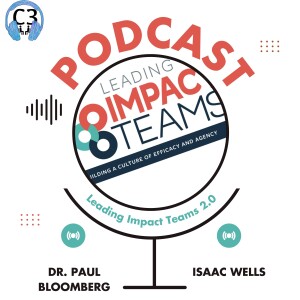
Wednesday Jan 03, 2024
Wednesday Jan 03, 2024
-Leading Impact Teams: Building a Culture of Efficacy and Agency -New book - we wanted to share more of the explicit ‘how', as well as making sure equity is up front and present in this edition. It is infused with culturally responsive sustaining education practices that are asset based, where we look at assessments through the theme of culture. We all have different cultures and are coming together in a classroom. We can honor the cultures of the different people within our classrooms or we can deny them and assimilate and be one. It is better if we honor each person's cultural backgrounds and we make more connections and we learn more.
-What is inquiry? What is it and what is it not? If we want our students to have agency, then our teachers have to have agency too, all while meeting school goals but having flexibility. How are we going to contribute back to where and how we learn?
-At Core Collaborative we practice what we teach. We are always learning and reflecting. We are taking input from so many different sources, a massive learning community.
-Efficacy’s 4 sources: safety, models of success/success criteria, feedback, and mastery moments. Agency is the opportunity and ability to take control of your own life. To make decisions that help yourselves and help others. Looking towards collective teacher efficacy.
-Teachers have influence and agency over their classroom. Goal consensus, teachers gathering with the principal. Are we actually looking at the data collaboratively together, brain storming what our goals could be as teachers, and creating those goals collectively? Having cohesion, where are we going three years from now? We need agency over what we are doing within our schools. Are our interventions quality? Self efficacy moving to teacher collective efficacy.
-Design thinking to enhance PLC work. Starts with the core, empathizing with your client- your students, parents, and teachers. We started doing a lot more empathetic interviews to be better and be able to understand the root cause of the problem because we were talking to the people who the problem mostly impacted. Empathy and prototyping phases really set this inquiry apart. This work really excelled our work within high school PLCs.
-We have to honor parents on their terms, honor their culture and the way they see education. We need not to make it about what we need, but about what do you need? What can we do better for you?
- As educators, we need to acknowledge the cultural strengths that kids already have. These strengths can be used as a source of knowledge to build from. The asset based approach is vital.
-They are already whole. We have to speak about them as whole people. No one in the room is broken, you all are totally whole. The system is broken. The more that we look at our deficits, the more we find.
-Learning is a partnership and it happens socially before it happens academically. At the heart of the model is to develop self empowered learners and that is another way to think of agency. Students who are able to live in the world with a belief that they can have an impact on their lives and the lives of others with the power and spirit to take chances and try that.
-Teaching kids how to learn to learn.The better you understand yourself, the better you are able to understand others.
Connect with Peter and Isaac:
www.thecorecollaborative.com
@thesocialcore or @corecollaborative
Facebook - Search Leading Impact Teams
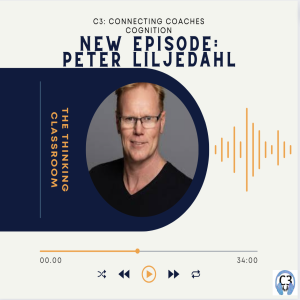
Wednesday Dec 06, 2023
Wednesday Dec 06, 2023
-Building thinking classrooms- around the notion that students spend time in classrooms not thinking. Many structures are not designed for thinking, and instead for conformity and compliance. 15 years of research before the book, and the research continues.
-One of the least conducive places to have students do thinking is at their seat writing in their notebook, but one of the most conducive spaces for students to do thinking is standing in random groups of three, at a whiteboard or something vertical and erasable. It is about getting them up and thinking.
-Task in relation to the student. If we want our students to think we have to give them something to think about. To be a thinking task it needs a particular relationship to the student.
-The whiteboard is a better space for that thinking to manifest. Everyone has to be able to access the task.
-Whiteboard- Everyone is oriented with the work the same way, they can see other students’ progress, I can access their learning more readily, I as the teacher can intervene right now. Standing is just so much better than sitting. When students are sitting they feel anonymous. The further from the student, the more anonymity. When they feel anonymous they are more disengaged.
-More engagement from a question if written on a whiteboard, as opposed to printed on paper.
-You have five minutes. They are with you on your feet and talking to each other. Research shows beyond five minutes, the more passive students become and the transition to being an active learner is harder.
- In a thinking classroom you say the minimum possible to start question number one. Then we can give them another question and another. We can never unsay what we say at the beginning. The moment we tell them how to do it, we have sucked the thinking out of the task. Need to bring order to their thoughts.
-Mimicking: Template for exactly how to do this problem. Mimicking is not the same as thinking or learning. It is mastering or memorizing routines that they truly need to make meaning. Students take the process and plug it into the template teachers present. Mimicking always runs out. How do we break these habits? How do we help students and ourselves break these habits? We have to break the habit ourselves and then support them and give them success.
-Students don't listen to what we say, they listen to what we do. When teachers are too perfect, students try to be too perfect.
- I can’t hear what you are saying, your actions are too loud.
-Divergent vs. convergent thinking - Gallery walk. The teacher is the guide and we are taking a tour. We are going to look at little portions of the boards. Present the tentative learning with students. Others talk about the board work, we invite them to think about it and draw conjectures about what it is, and then that creates a thinking discussion about this and engages in a variety of different boards this way. Are they thinking?
- We are the educators, we are creating the experience. We are very deliberate about what that experience is.
-Random groups - creates a space where students can actually learn from each other. Random groups is the engine to make all of this work.
-How can I help teachers’ notice things?
-Try to pull from teachers something that is absolutely positive about what they already do. What is the best lesson you ever taught? How do we amplify their successes instead of the urgency of the immediate?
Connect with Peter:
Buildingthinkingclassrooms.com
Facebook: Groups→ Search “Building Thinking Classrooms” and find your group 50+
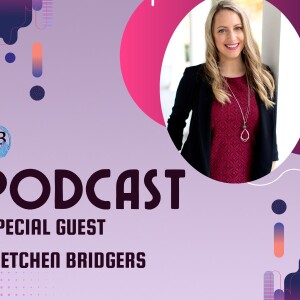
Wednesday Nov 01, 2023
Wednesday Nov 01, 2023
Gretchen is a National Board-certified elementary school teacher from Charlotte, NC.
In 2006, Gretchen received her bachelor’s degree at Marist College in Poughkeepsie, New York. In 2010, she received her master’s degree in Curriculum and Supervision from the University of North Carolina at Charlotte.
Gretchen taught grades 2, 3, and 5 before transitioning into the role of a New Teacher Development Coach for The New Teacher Project [TNTP]. During this time, she also published her first book for new teachers called “Elementary EDUC 101: What They Didn’t Teach You in College” to help prepare future teachers for the realities of life in the classroom.
For more than a decade, Gretchen has passionately mentored and coached educators, led professional development experiences for school building staff, and presented at district and national conferences as the owner of Always A Lesson. Her impact continues to amplify serving educators worldwide through her blog, Empowering Educators podcast, classroom resources, professional development courses and personalized coaching opportunities. She has since co-authored a book with over a dozen other elite educators called “Teachers Who Know What To Do- Experts In Education” to share proven strategies that transform classrooms and leaders around the world as well as written her third book “Always A Lesson: Teacher Essentials for Classroom & Career Success” that comes out Spring 2024.
Whether you’re teaching a lesson or learning one yourself, there’s Always A Lesson.
Show Notes:
-Strategies for super collaborative relationships, being an actual coach, under your leadership, and with your style.
-Time and consistency are key- -What worked in coaching? What can we replicate?
-Coaching debriefs: no tangents, time-stamp, be open and honest. We are protecting our time.
-That was a textbook example- super focus. You have to keep laser focus. Know what you are trying to accomplish and keep it consistent. Always connect it to the evaluation rubric.
-Name the thing that you notice, and add one thing they can do to improve it. The important piece is to reflect on what happened, and also name one thing to improve it!
-Transparency and understanding that we are both learners is so huge! 4 aspects of instruction and order matter, pay attention to the sequencing. Lesson design as opposed to lesson planning. Do you do them consistently at a high level? Logistics and details?
-Get to know your teachers and see where they are at. Please be present in the building. Be aware of the culture, keep tracking, and build in results. If you can set the system up for yourself, especially in a quantifiable way, make sure to show your impact!
-GO BE GREAT! - You are now empowered more than before!!! Do it and do it well!
-Truly listen and ask deep questions.
Connect with Gretchen:
Alwaysalesson.com
New Book Coming Soon: Teacher Essentials for Classroom and Career Success
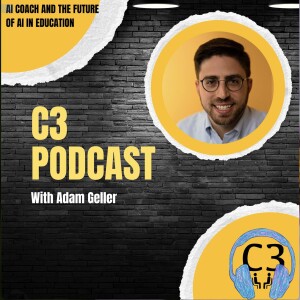
Wednesday Oct 04, 2023
Wednesday Oct 04, 2023
Adam Geller is the founder of Edthena and author of Evidence-Based Practice. He started his career in education as a science teacher in St. Louis, Missouri. Since 2011, Adam has overseen the evolution of Edthena from a paper-based prototype into a research-informed and patented platform used by schools, districts, teacher training programs, and professional development providers.
Adam has written on educational technology topics from various publications, including Education Week, Forbes, and EdSurge. He has been an invited speaker about educational technology and teacher training for conferences at home and abroad.
AI Coaching is a video on the left, and the AI Coach acts as a guide on the side to help teachers observe themselves. It is a (chat style of communication), not telling a teacher what to do, but rather asking questions and opening the doors so that they can walk through them and learn about themselves.
Lack of bias with AI Coach, never switches from facilitative to directive coaching.
This is the coaching that can happen between real life coaching. It helps to empower educators to own their own professional growth.
The coaching conversation can start and stop as needed for the educator who is investing in coaching. A real pause button.
Double take moment for Adam: Survey information was presented, a 30-year veteran, was skeptical and was also impressed with the process and learned about her students in her classroom.
“Ah- ha,” moments analyzing video - seeing the things we don't see. It highlights the true goal of professional learning. We all want to continually increase effectiveness. The power of this tool is huge and given what they have been asking for all the time.
-Continuous improvement over time… improve small nuances.
Creating a place of safety for those teachers and professional learning contacts and coaching contacts. Creating a private space.
I am human and I have opportunities to be better. AI is impartial and has no bias.
Challenges- how do leaders ask to have AI-powered tools in our schools or classrooms? How are these moderated? How are these being implemented?
It is asking me questions as opposed to telling me what to do.
Personalization of PD - In-person and AI Coach
Edthena - AI Coach - what is coming for the next decade?
It is coming, ... Subject-specific, Pedagogically sound, questioning related exact things happening in that classroom?
Respect teachers as professional adults, and learners as well as give them a lot of agency!
FREE TRIAL OF EdthenaAI: tryaicoach.com/c3podcast
Connect with Adam Geller
Website:https://www.edthena.com/
pltogether.org
Twitter:@edthena
Evidence of Practice Book
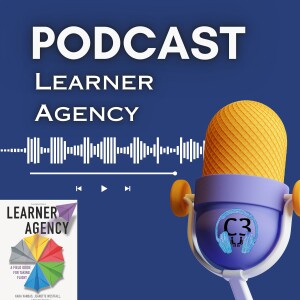
Wednesday Sep 06, 2023
Wednesday Sep 06, 2023
Learner Agency: A Field Guide for Taking Flight is a boots-on-the-ground resource for those who wish to foster greater agency for students and adults alike within their classroom, school, or school system. Written by practitioners who have experienced the triumphs and struggles first-hand, the book offers a framework for moving from building knowledge to making meaning and applying the understanding of practices and systems that support agency.
-Aspired to write this book based on our common work within a district where the three authors came together. Our hope with agency is for students to understand themselves as learners, build their identity as a learner, and learn what to do when they don't know what to do, as well as learn what to do with a bit of independence and understanding they need to move it forward. Kids need time and practice! Fail, learn, and get up and try again! That was the fuel of this project.
-Building a recipe to accelerate learning. We wanted to share the experience and spread the word about what we found that worked. Every time we shared it worked for them too. We wanted to bring that food for thought, and how do we reframe what learning should look like, when we have the opportunity..
-COVID has taught us to think more about our learners. To think about who is in the seat and their means they need to learn anything. How to learn and the dispositions they need in this ever-changing world.
- Push learners to the deep! We have to be ok with that. We need dialogue and discourse.
-We need clarity about what success is. What does it look and sound like?
-When kids have clarity about what is expected of them they are much more likely to take on a challenge and their anxiety goes down.
-Let us know what good learners do.
-What will this look and sound like in my classroom?
-Secret Sauce: Accountability with students and what they were learning. Where are you, where are you going, what do you do when you are stuck?
-The heart of the student agency is building efficiency at every level.
-Mindset shift - get stuck and unstuck all the time.
-Honor the learning process = the more successful the learning is.
-Sharing your story is so important.
-Does a learner know where they are and speak to this?
-Mastery moments with upward spirals.
-Tell your story to build capacity.
-Does it align with your graduate profile?
-Celebrate every step of progress!
-Dialogue and discourse.
-Get comfortable with being uncomfortable. Permission to ask questions that are hard. wE have permission to try another way. We have permission to give ourselves time to learn something, before we have to do it.
-Mastery Moments
-We are doing so much right, and we need to fixate on that, not the small errors along the way
-If we shift our focus, everything shifts!
-Celebrate the wins.
-Permission needs to be granted. What are you learning? And what does that look like? Does the learner know what that looks like?
-You are changing outputs not inputs.
Connect with the authors:
@TheSocialCore @MimiToddPress
-Affirm, push, inspire to make a difference in the life of learners - Katie Martin!
-Be the learner, you want all to be!
-Mastery moments happen, celebrate!
-Still, I am learning.
-Listen authentically and give authentic feedback.
-Listen. Ask questions to get to listen.
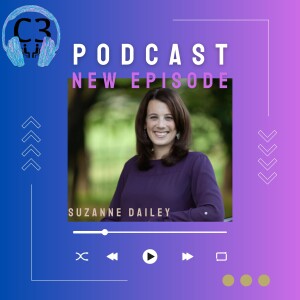
Wednesday Aug 02, 2023
Wednesday Aug 02, 2023
Suzanne Dailey is an instructional coach in the Central Bucks School District, where she has the honor and joy of working with over 500 elementary teachers and 8,000 students. She teaches model lessons, facilitates professional development sessions, and mentors teachers to be the best for the students in front of them.
Suzanne is Nationally Board Certified, a fellow of the National Writing Project, and has a Masters Degree in Reading. She is dedicated to nurturing and developing the whole child and teacher and presents these topics at a local, state, and national level.
Suzanne is the author of Teach Happier this School Year: 40 Weeks of Inspiration & Reflection and the host of the popular weekly podcast, Teach Happier.
-Suzanne has spent 10 years as an instructional coach. She coaches over 500 educators in 15 elementary sites, currently. Prior to that, she was a 4th grade educator and a reading specialist.
-”As an instructional coach I get to impact more students, by impacting their teachers. Knowing that there are really big ripple effects happening between fifteen buildings is a huge responsibility but also such a wonderful privilege and opportunity each day. No two days are the same but I feel the impact is more widespread.”
-Professional Development and Personal Development - teachers need personal development. We need to affirm who we are, and what we need, as the person behind whatever our role is.
-Teachers are not superheroes, we are real humans who need to take care of our own selves and families at home, before we can really show up beautifully for kids.
-Approach tasks in the two pronged approach of personal development and professional development.
-Adaptations have been so huge since March 2020 - look at that list, but look at the trends that will move us forward!
-Science of Reading- small tweaks to make our instruction so much more impactful. Phonics explicitly and systematically - building readers!
-Knowing more, so we get to be a little bit better for the kids in front of us!
-Student and teacher wellness- student and teacher readiness.
-Small shifts, Big gifts - Teach Happier.
-What is in your diet? - What podcasts are in your ears? What news feeds are in front of our faces? What can we control and navigate with small shifts? What is within our realm of influence?
-How might we celebrate our brand new teachers in a similar way to our retirees? We all have fought through the year, how might we make everyone feel acknowledged? How do we overtly honor and acknowledge teachers making it through their first year?
-How do we get someone from, year one to year 30?
-Do your work and also, gather yourself beyond the role.
-Every year is a huge journey! Honor that all the way through!
-Conscious Acts of Kindness
-”I don’t know if I’ve done enough!” - Master Teacher - Goes to show no matter how great we are, no matter how impactful as teachers we are, we carry so much with us as teachers. And that emotional lift, day in and day out, is a real thing. But I think it is finally being acknowledged and we are getting a little more space to share that.”
-When we know we have each other, that is the key to gaining and retaining great educators!
- People, People, People - are we seeing the person behind the student, teacher, educators, or administrator? How can we flex?
-Little shifts of language - as inclusive as possible - I can’t wait to work together…we, us, let’s - just softens every interaction.
-HAVE A WONDERFUL SCHOOL YEAR!
Connect with Suzanne:
Twitter: @DaileySuzanne
https://suzannedailey.com/
https://suzannedailey.com/podcast

Wednesday May 03, 2023
Wednesday May 03, 2023
Nita Creekmore is an Instructional Coach who lives just outside Atlanta, GA. In the 19 years, she has been in education, she truly believes that in all aspects of the field, relationships must always come first. She has obtained a Bachelor’s in English, Master’s in Elementary Education, and Educational Specialist in Supervision & Leadership. She currently works for Bright Morning Consulting as a Presenter. Nita is also an Instructional Coach Consultant through her business, Love Teach Bless, LLC.
Nita is married to Michael Creekmore, Jr., and has four children. In her free time, she loves spending time with her family and friends, attending her kids' activities, practicing yoga, and relaxing with a good book.
Episode Notes:
-Coaching is embedded professional development that is transformational. Coaching is supportive, it is being in community with one another, but also learning as a coach alongside the coachee.
-Reflection starts with yourself. The coach needs to self-reflect and build a relationship to build space for vulnerability in order to do deep reflection. The things you ask your coachees to do, you should do every day as well. Use journaling and coaching conversations with yourself to do that reflection work.
-Reflection with educators can be stretched with the conversation with a coach. There needs to be a lot of trust and relationships built to make this successful. What emotions are coming up for you? What did you feel like in the observation? What constitutes joy for you
in teaching?
- The 5 Whys - use these to deepen the reflection.
-If you do not have a coach, you can use your team to reflect. You can even dig into the 5 whys with yourself. Try to elicit the reflection. Offer yourself grace and self-compassion. Try celebratory reflection!
-Closeout conversations, having the space to reflect on their big wins or their goals for moving forward. These are so important to tie up the year and think through the areas that they felt that they were winning and trying to grow more in. Coaches can also do this for themselves on paper in order to reflect for themselves to become even more transformational as a coach.
-Inspired Educators, Inspire Educators
-When you think that you are having a teacher that you cannot reach, always go back to yourself and look at how you are showing up. And also look at how you started that relationship. What could have been done differently? How can it be restored, if needed?
Connect with Nita:
Instagram: LoveTeachBless
https://love-teach-bless.com/
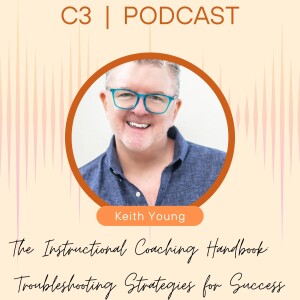
Wednesday Mar 29, 2023
Wednesday Mar 29, 2023
Keith Young is an education coach, trainer, and writer. Keith was raised in the foothills of the
Appalachian Mountains of northern Alabama. After a short stint at seminary, he pivoted to
teaching secondary students for the U.S. government in Germany. In his first years of teaching,
he developed a knack for leading and training colleagues. Eventually, Keith shifted full-time to
training teachers and leading school improvement efforts at the school district level. Later, he
became a principal, leading school turnaround work and regularly increasing student outcomes
by double digits in Colorado, Puerto Rico, and Arizona. Along the way, Keith picked up a
multiplicity of advanced education degrees. Nowadays, Keith lives on the coast of South
Carolina and trains and coaches administrators, school leadership teams, and teacher coaches.
As a coach, he’s known for “telling it like it is” and using a blended coaching model. The schools
Keith coaches across the United States and internationally produce significant increases in
student outcomes academically and affectively.
Episode Notes:
-Keith has a varied background and is in about 1,000 classrooms a year coaching educators, modeling coaching with coaches, as well as modeling coaching for administrators and doing model lessons with students.
-What is a coach? - A coach is a professional who prompts a teacher, trains a teacher, or instructs a teacher. Think of your piano teacher, your baseball, or gymnastic coach. Those effective practices inform our coaching.
-The Instructional Coaching Handbook: A one stop shop to look at those trouble spots in coaching. Give ideas, try, and see what works! It is a place to grab ideas around anything troubling you in coaching.
-Knight, Aguilar, and Marzano were pulled from and influenced these amazing authors.
-Coaching is about empowering educators, this is for your whole life. This is for the whole generation of students you teach.
-Dot and circle analogy- focus on what you can control.
-Teach teachers to curate- curate a strategy to get past this hardest to teach ideas, concepts, and skills.
-Coaching is a professional conversation with a goal and don’t forget to be kind.
-Brainstorming is a super power.
Follow Keith:
Twitter: @a_keithyoung
Website: Akycinsulting.com
LinkedIn & Facebook: akeithyoung
Instagram: akyconsulting
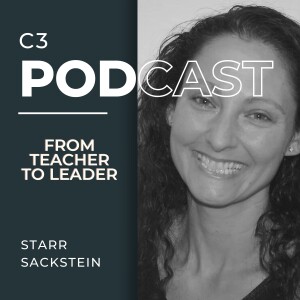
Thursday Mar 02, 2023
Thursday Mar 02, 2023
Starr Sackstein has been an educator for 20 years and is currently a full-time educational consultant, instructional coach, and speaker. Starr received National Board Certification in 2012 and was recognized as an outstanding educator that year by Education Update. Association and served as the New York State Director for JEA. She was named an ASCD "Emerging Leader" class of 2016 and had the opportunity to give a TEDx Talk called "A Recovering Perfectionist's Journey to Give Up Grades" and has spoken on The Red Dot Cafe in affiliation with TEDx San Antonio about grading practices.
She is the author of many educational books She also blogs on Education Week Teacher at "Work in Progress" and has contributed to several other publications.
Episode Notes:
-When you are deciding whether to take on a leadership role, make a pros and cons list. What are you most afraid of losing? What are the things you love? Evaluate what is important to you.
-If you are ready to leap to leadership, put on your best face when interviewing. Just as they are interviewing you, you are interviewing them to see if it is a good fit. Try to ask a lot of strategic questions when you interview. Just because you interviewed, it does not mean you have to accept a position. Are you philosophically aligned with the role you are moving into? Find a home that is a good fit, do not worry about damaging your future by making a move in your career.
-You will likely hit a state of overwhelm when you move to a leadership role. Be ready with an open mind and utilize others as your teachers. Be mindful of what you say and how you say it. Build relationships and listen first.
-You know you are making an impact when the early adopters are taking you up on your offers to coach or collaborate.
-You can still be a leader within the classroom: mentor, join a committee, be a coach, state run or regional organizations, Find your own way to lead at your site!
-Be mindful of how and when you share information as a coach. Apologize when you make a mistake, be clear and own your actions.
-Changing the world one mind at a time!
Connect with Starr:
Twitter: @MsSackstein
Website: https://www.mssackstein.com/
Masteryportfolio.com
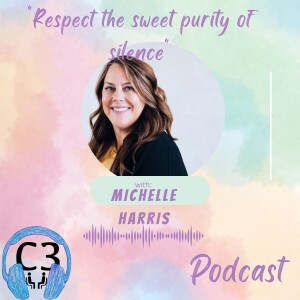
Saturday Feb 04, 2023
Saturday Feb 04, 2023
Michelle Harris, Senior Consultant at Instructional Coaching Group (ICG)
has spent almost three decades as an educator, starting as a Special
Education Paraprofessional in Salt Lake City, Utah before completing her
Masters in Teaching at Pacific University and teaching middle school in El
Cajon, CA and Beaverton, OR. She served as an instructional coach for
teachers and students in a comprehensive 6-8 middle school as well as a
K-8 school. She then became an administrator in a 6-12 IB school, and
two comprehensive 6-8 middle schools.
Michelle is a seasoned staff developer, certified in multiple Training of the
Trainer programs such as Sheltered Instruction, Data-driven Decision
Making, Effective Teaching Strategies, and Non-Fiction Writing. She has
worked for Jim Knight since 2012, after participating in a Coaching Study
with Jim through the University of Kansas in 2009-2011, and has facilitated
workshops, coached, and keynoted across the United States and Canada,
as well as in multiple European countries, Asia, and Africa.
Recently, Michelle partnered with Jim Knight, Sharon Thomas, and Ann
Hoffman to author The Instructional Playbook: The Missing Link for
Translating Research Into Practice and Evaluating Instructional Coaching:
People, Programs, and Partnership.
Through ICG, Michelle facilitates workshops, coaches, and provides
consulting for coaching programs around the world. She lives in Portland,
OR with her husband, two sons, and three cats, and one small corgi.
Episode Notes:
-Michelle has been in education for almost 30 years and was trained with Jim Knight in instructional coaching.
-A coach is a partner who opens up a physiologically safe space with time for thinking, reflecting, problem solving and ultimately turning all that talk into action in the classroom, promoting change.
-Sometimes in coaching there is a lack of role clarity. If you do not have clarity on what you do and how you do it within the system, it is hard to do a quality job in coaching.
-Teacher evaluations do not fit coaching.
-Coaches need an evaluation system that is 100 percent aligned to the outcomes we are seeking. It is critical to have role clarity as an instructional coach.
-We speak about surface coaching versus deep coaching. Both are vital to the role of coaching. Surface coaching helps to build rapport and enhance your street credit. Deep coaching is the impact cycle and doing coaching cycles with educators around specific goals.
-Collect data on who is coming to you and what are they asking for, what patterns are we noticing, this helps us impact PD in our buildings or systems.
-Collect data on the impact cycle: where did you start? What was your goal? What strategies did you utilize? What was your end goal? How long did it take kids to meet that goal? What tweaks did you make along the way?
-Collect data to show your coaching impact. Show the difference you are making. Collect that evidence of difference making.
-Learning Architecture with support for the coaches is vital.
-Coaching is not fixing people. We need an asset model. There should not be a stigma in education for using a coach. Think about sports: everyone uses a coach.
-The practice of video recording your coaching can be such a remarkable reflective practice for growth.
-Respect the sweet purity of silence.
Connect with Michelle:
LinkedIn: MichelleRodgersHarris
Twitter: @harrismr1
A Podcast for the busy coach